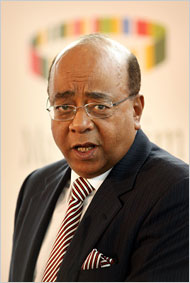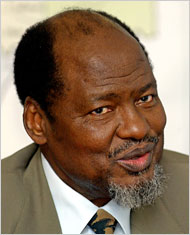| @wehaitians.com | |
No one writes to the tyrants | |
HistoryHeads/Not Just Fade Away |
| Correspond with us, including our executive editor, professor Yves A. Isidor, via electronic mail: |
| letters@wehaitians.com; by way of a telephone: 617-852-7672. |
| Want to send this page or a link to a friend? Click on mail at the top of this window. |
|
 |
|
| Posted Tuesday, October 23, 2007 |
| Mozambican Is Awarded $5 Million for Leadership |
By MICHAEL WINES |
JOHANNESBURG, Oct. 22 — A new foundation devoted to improving African governance has awarded a huge inaugural prize — well over $5 million — to Joaquim A. Chissano, Mozambique’s second president and a crucial figure in ending its 16-year civil war.
 |
 |
|||||
|
|
Mr. Chissano won the prize on Monday for his “achievements in bringing peace, reconciliation, stable democracy and economic progress to his country,” said Kofi Annan, the former United Nations secretary general who leads the award panel of the foundation, which is named for its founder, Mo Ibrahim, a Sudanese billionaire. Mr. Chissano’s decision to retire as president in 2004, although he was eligible to seek a third term, was also an important factor, Mr. Annan said.
The sheer size of the award, the Mo Ibrahim Prize for Achievement in African Leadership — billed as the world’s most lucrative — underscores the need for great African leaders, several analysts said. But it also may encourage some leaders whose financial prospects after political life would normally be dim. Mr. Chissano, who turned 68 on Monday, will receive $5 million over the next 10 years and $200,000 a year thereafter for the rest of his life. Projects he supports may receive up to $200,000 annually over the next decade.
The award had a relatively small bank of candidates: sub-Saharan leaders who were freely elected, governed according to their constitutions, and left office in the past three calendar years. Thirteen leaders left office in that period, but the BBC reported Monday that six of them had come to power through coups.
The honor is financed entirely by Mr. Ibrahim, who founded Celtel International, a cellphone service operating in 15 African nations that was sold in 2005 to a Kuwait company for $3.4 billion. Mr. Ibrahim established his foundation to promote good government and democratic ideals in the 48 sub-Saharan nations.
In a telephone interview from London, Mr. Ibrahim said he hoped not only to reward the continent’s good leaders, but to inspire a new generation of leaders “who look at politics not in a cynical way, but as an honor, as a way to move things forward.”
“Africa is rich — really rich,” he said. “It’s really a wonderful continent. What we need to do now is enforce good governance, and it’s happening, perhaps not as quickly as I would like. All we need to do is push.”
Mr. Chissano was a founder of the Mozambican Liberation Front, a Marxist guerrilla movement that battled to end Portuguese rule in the 1960s and 1970s. But he proved willing to abandon conflict and ideology at critical junctures to turn his nation from a war zone into a stable, if wrenchingly poor, democracy.
He helped negotiate the 1974 Lusaka Accord that freed Mozambique from Portuguese rule, but the nation quickly sank into civil war between his communist-backed government and a rightist, South Africa-backed movement called Renamo.
When Mozambique’s first president, Samora M. Machel, was killed in a 1986 plane crash, Mr. Chissano succeeded him. Political analysts say he deftly brokered an end to the war and shepherded a new Constitution based on democratic rule. He moved from Marxist economic policies to market-based ones, and in the past decade Mozambique has enjoyed economic growth of 7 percent to 8 percent a year.
He was chosen president in 1994 in the nation’s first multiparty elections and re-elected in 1999. He chose to retire in 2004 and has frequently served since then as a diplomatic troubleshooter for the United Nations and other organizations.
Mr. Chissano was in northern Uganda on Monday as a United Nations special envoy on a regional conflict, and apparently was unaware of his award.
Copyright 2007 The New York Times Company. Reprinted from The New York Times, International, of Tuesday, October 23, 2007.
| Wehaitians.com, the scholarly journal of democracy and human rights |
| More from wehaitians.com |